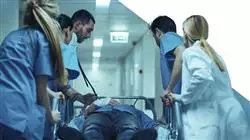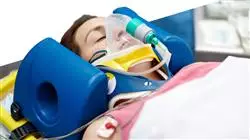University certificate
The world's largest faculty of medicine”
Description
Keeping knowledge up to date is key to providing safe and efficient patient care in critical situations. Specialize with the most advanced program, which includes
the latest developments in coronavirus infections"

Healthcare professionals must be specifically prepared to act in an emergency situation in order to maintain the level of quality and safety in patient care. Adequate updating becomes an indispensable tool to ensure safe and efficient care. They must be prepared to identify and deal with any critical situation they encounter quickly, with full capacity to plan, manage and apply the necessary health resources at the different levels of medical care. This includes patient care processes involving patients with emergency conditions, emergency situations, as well as incidents of special operational difficulty, whether they are the result of an accident with multiple victims, seismic or climatological phenomena, or even war or terrorism.
The medicine applied in emergency situations must also contemplate a wide knowledge of the available means and equipment, their applications and complications, so that they can be used in each specific situation. For this reason, an adequate updating of knowledge requires a comprehensive approach to techniques, procedures and application regulations, a complete and exhaustive training program that becomes an essential tool to identify and deal with any critical situation, especially in circumstances
of special operational difficulty.
This includes disaster situations, where material and human resources become insufficient, infrastructures are severely damaged, and the number and severity of patients generate particularly critical situations. These features call for a specific and in-depth approach to management, organization and health care in adverse circumstances. Catastrophic events in the recent past show the importance of having health professionals with specialized training to be able to provide care in particularly serious circumstances.
This program provides students with the knowledge and skills required to provide emergency health care quickly, efficiently and safely. Tools that will allow you to properly assess emergency patients, to know and apply the appropriate procedures in each situation, or to become familiar with the drugs frequently used in critical situations. All this through the most up-to-date training program, including the latest developments in coronavirus infections.
Access the most comprehensive program to act in critical situations with the professional master’s degree in Emergency Medicine"
This professional master’s degree in Emergency Medicine contains the most complete and up-to-date Scientific program on the market. The most important features of the program include:
- Practical cases presented by experts in the field of patient care in accident, emergency and disaster situations
- The graphic, schematic and practical contents with which they are created provide scientific and practical information on the disciplines that are essential for professional practice
- The latest information on patient care in emergency situations
- Practical exercises where self-assessment can be used to improve learning
- With emphasis on innovative methodologies for patient care in accident, emergency and disaster situations
- Theoretical lessons, questions for experts, discussion forums on controversial issues and individual reflection work
- Content that is accessible from any fixed or portable device with an Internet connection
This professional master’s degree is the best investment you can make when choosing a refresher programme to update your existing knowledge of Emergency Medicine"
Its teaching staff includes professionals from the field of medicine, who their work experience to this program, as well as renowned specialists from leading societies and prestigious universities.
The multimedia content, developed with the latest educational technology, will provide the professional with situated and contextual learning, i.e., a simulated environment that
will provide an immersive training experience designed to train for real-life situations.
This program is designed around Problem-Based Learning, whereby the physician must
try to solve the different professional practice situations that arise throughout
the program. For this purpose, the specialist will be assisted by an innovative interactive video system created by renowned experts in the field of accidents, emergencies and disasters with extensive experience.
We offer you an interactive video system that will make it easier for you to study this professional master’s degree"

In our professional master’s degree, you will learn the main problems faced by doctors in emergency situations, including the main developments in the diagnosis and treatment of COVID-19"
Objectives
The program's primary objective is focused on theoretical and practical learning, so that the physician is able to master, in both a practical and rigorous manner, emergency care techniques.

Gain up-to-date knowledge on the latest COVID-19 developments to be able to contribute to decision-making with quality and confidence”
General Objective
- Gain the necessary up-to-date knowledge of caring for a patient in a serious condition, with the aim of improving the quality and security of your healthcare practice in accident, emergency and disaster situations
Specific Objectives
Module 1. General Aspects
- Differentiate between the concepts of accidents, emergencies and disasters
- Identify the fundamentals of emergency health care
- Apply clinical and non-clinical professional skills in emergencies
- Define the structure and organization of the accident and emergency services
- Use medical records in the emergency department and understand the most relevant legal and ethical aspects of health care in emergencies
- Prioritize, organize and manage patient care in the most efficient way through triage
- Understand the basic workings of an emergency coordination center
Module 2. Emergency Services and Medical Transport
- Incorporate the criteria for selecting the most appropriate mode of medical transport in daily practice
- Describe the main characteristics of medical transport, its pathophysiology and the different EMS transport options
- Analyze the risk management of transport for patients and staff
- Identify the equipment and the communication systems in an EMS
- Describe the concept of continuity of care and hospital transfer
Module 3. Advanced Cardiovascular Support
- Gain up-to-date knowledge of the process for performing an ECG
- Interpret electrocardiogram tracing in emergency situations
- Apply protocols for medical care in cases of heart rhythm alterations
- Identify the life-threatening pathophysiological processes
- Describe the different conditions that cause chest pain and apply the appropriate protocols in each case
- Recognize the different signs and symptoms typical of ischemic heart disease
- Apply the specific procedures in Acute Coronary Syndrome and assess the possibility of prehospital fibrinolysis
- Know how to address congestive heart failure and acute pulmonary edema
- Correctly use non-invasive mechanical ventilation
- Know how to address cardiac tamponade and pericardial effusion
- Describe pericardiocentesis and pericardial drainage techniques
Module 4. Cardiovascular Emergencies
- Establish the diagnosis and management of acute pericarditis and cardiac tamponade
- Establish the diagnosis and management of acute coronary syndrome
- Detect urgent patterns in diabetic patients, elderly or dementia patients, as they are paucisymptomatic and this could mask the characteristics of a potentially life-threatening pain
Module 5. Respiratory Emergencies
- Recognize acute dyspnea and its most frequent causes
- Establish the diagnostic approach to acute dyspnea in emergency departments
- Identify the main clinical manifestations of aggravation of acute bronchial asthma crisis
- Describe the therapeutic behavior in bronchial asthma exacerbations according to their severity
Module 6. Neurological Emergencies
- Identify cases of encephalic vascular accident (EVA) and provide timely treatment
- Review the types of studies for the identification of encephalic vascular accident
- Enable physicians involved in the initial care of EVA to approach a practical and simple way of updated guidance
- Present an update on current diagnostic methods and the different therapies available, depending on the case of each patient, for acute ischemic stroke
Module 7. Digestive System Emergencies
- Define the abdominal pain
- Effective medical history taking for acute gastrointestinal bleeding and vascular disorders
- Establish procedures to identify acute gastroenteritis
- Establish protocols for action in acute pancreatitis
Module 8. Endocrine and Metabolic Emergencies
- Acquire in-depth knowledge of the definition, pathophysiology and classification according to severity of the most frequent endocrinometabolic emergencies
- Establish diagnosis and apply effective treatment for these emergencies
Module 9. Nephrourological Emergencies
- Tackle the most common nephrourological diseases and how to approach their diagnosis
- Establish the types of anticoagulation and thromboprophylaxis to be applied in each case
- Understand risk exposure and exposure to potentially contaminating materials
- Delve into sepsis and septic shock
Module 10. Hematological, Immunilogical and Infectious Emergencies
- Characterize the main mechanisms in hemostasis to maintain blood flow and the integrity of the vascular system
- Correlate its two main components: primary hemostasis and secondary hemostasis
- Identify the most frequent acquired and congenital causes of coagulation disorders
- Analyze diagnostic criteria and their therapeutic implication when caring for a patient with disseminated intravascular coagulation (DIC) and sepsis
Module 11. Psychiatric Emergencies
- Understand psychopathology at the prehospital level, as well as the factors that relate to the physician and the patient
- Approach an urgent case in an efficient way
- Learn how to conduct a psychiatric clinical interview
- Describe the different types of psychiatric disorders
Module 12. Ophthalmologic Emergencies
- Delve into the most common diseases of the eyelids and lacrimal system
- Address red eye, diagnosis and treatment
- Know the reasons and treatments for sudden vision loss
Module 13. Otolaryngological Emergencies
- Review the anatomy of the external auditory canal
- Establish clinical and diagnostic classifications, as well as referral criteria
- Treat foreign bodies in the nasal cavity and/or pharynx
Module 14. Toxicology Emergencies
- Establish the general aspects of the intoxicated patient, as well as their protocols of action
- Know the most frequent types of intoxications: drugs, mushrooms, medicinal, domestic
Module 15. Terminally Ill Patients in Emergencies
- Define the urgent complications in the terminally ill patient
- Provide end-of-life care
- Provide dermatological care in emergencies
- Delve into organ and tissue donation and discuss the approach with the patient and family members
Module 16. Obstetric Emergencies
- Detail the generalities of gynecologic bleeding, abnormal uterine bleeding and dysfunctional uterine bleeding. Outline aspects related to the types and classification
- Describe the characteristics in the diagnosis and treatment of dysfunctional uterine bleeding
Module 17. Pediatric Accidents and Emergencies
- Identify the most common gynecological-obstetric conditions in emergency care and state the precise guidelines to correctly resolve each case
- Review the main aspects of childbirth care, previous care, basic techniques of assistance, types of presentations, and dilatation, expulsion and delivery timings
- Identify the skills needed to deliver a baby in the out-of-hospital setting
- Identify the different emergencies in the pediatric unit
- Highlight the priority actions in emergency pediatric situations
- Understand the medical-legal documents and how to act in situations of gender violence and child abuse
Module 18. Severe Trauma Care
- Identify the different traumatology conditions in emergency situations
- Describe the action of health professionals in different types of traumas and their correct usage
- Specify the priority actions to be taken in polytraumatized patients
- Select the best option when mobilizing and immobilizing a trauma patient
- Use general procedures and techniques applied to critical patients in emergency situations
Module 19. Multiple Casualty Incidents (MCI and Disasters
- Organize material and human healthcare resources in multiple casualty incidents and disasters
- Implement disaster action plans with certainty
- Establish the criteria and guidelines for appropriate and efficient communication between the various agents involved in the emergency and critical care systems
Module 20. Diagnostic and Therapeutic Techniques
- Know the main consequences and initial handling of CBRN (Chemical Biological Radiological Nuclear) risk situations
- Explain new forms of bioterrorism
- Implement techniques for teamwork, motivation, leadership and dealing with uncertainty in situations
Module 21. Emergency Pharmacology
- Gain up-to-date knowledge of the procedures for the use of drugs frequently used in emergency medicine
- Identify the main emergency immunological pathologies and gain up-to-date knowledge of how to treat patients suffering from anaphylactic reactions
- Acquire up-to-date knowledge on how to care for intoxicated patients and injuries caused by environmental agents
Module 22. Other important aspects in emergencies
- Develop assertive communication skills for emergencies
- Provide patient safety
- Understand the new skills for professionals in the field of emergencies
Module 23. Update on Coronavirus Infections
- Know the microbiological characteristics of coronaviruses
- Know how to assess the morbidity and mortality of coronavirus infections
- Identify the main risk groups and mechanisms of coronaviruses
- Be able to perform the necessary tests for diagnosing Coronavirus
- Know how to apply the necessary preventive measures, as well as the most accurate treatments according to the type of patient

Train yourself for success with the help of this professional master’s degree in Emergency Medicine Your achievements will become your patients' achievements as well"
Professional Master's Degree in Emergency Medicine
Patients in serious situations, as a result of circumstances related to terrorism, war conflicts, seismic and climatological phenomena, traffic accidents, among others, require specialized care by health professionals. However, without prior education it is not possible to provide this type of services, so TECH Technological University developed a Professional Master's Degree in Emergency. Its purpose is to provide doctors with the tools, skills, abilities and knowledge to respond correctly to situations in which the patient's life may be compromised and different organs affected.
The most up-to-date Professional Master's Degree
Through a syllabus divided into ten content modules, taken over twelve months, students of the Professional Master's Degree in Emergency Medicine at the TECH's Faculty of Medicine will be able to learn about emergency services, medical transport, incidents with multiple victims and even the care of coronavirus infections, among other topics. Therefore, medical professionals will be prepared to differentiate the concepts of emergencies, disasters and catastrophes, describe the main characteristics of medical transport, its pathophysiology and the different transport devices, and prioritize, organize and manage care in a more effective way through triage.







